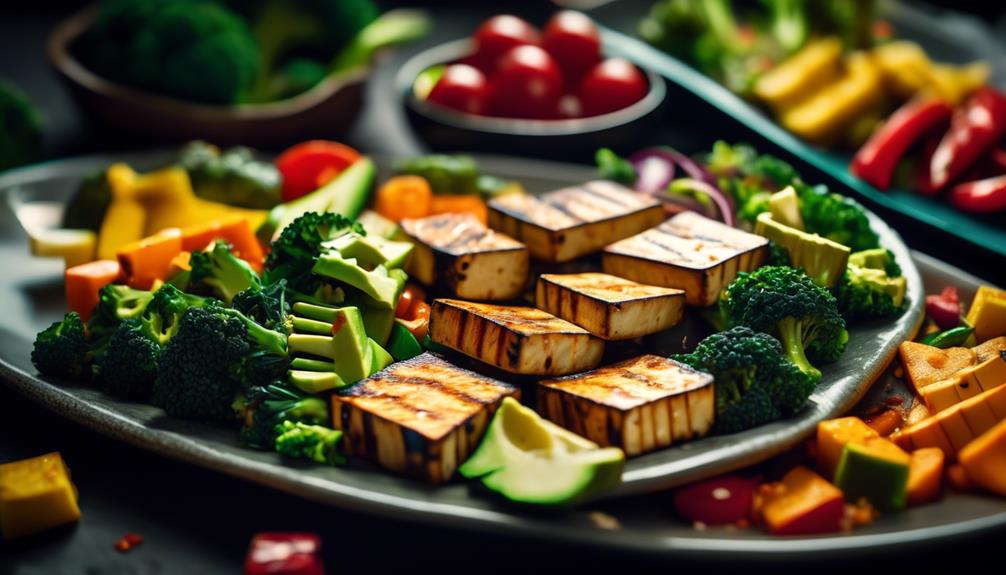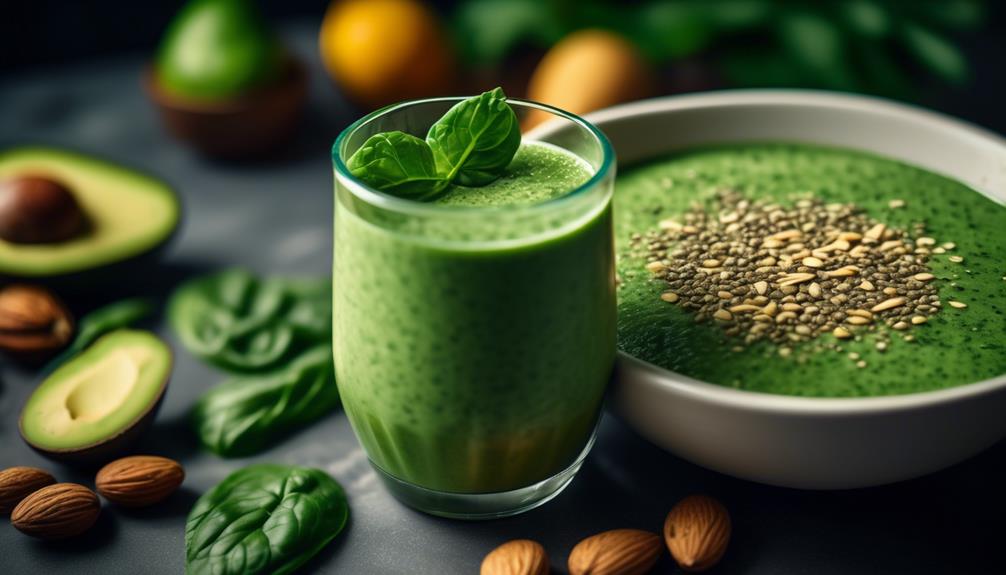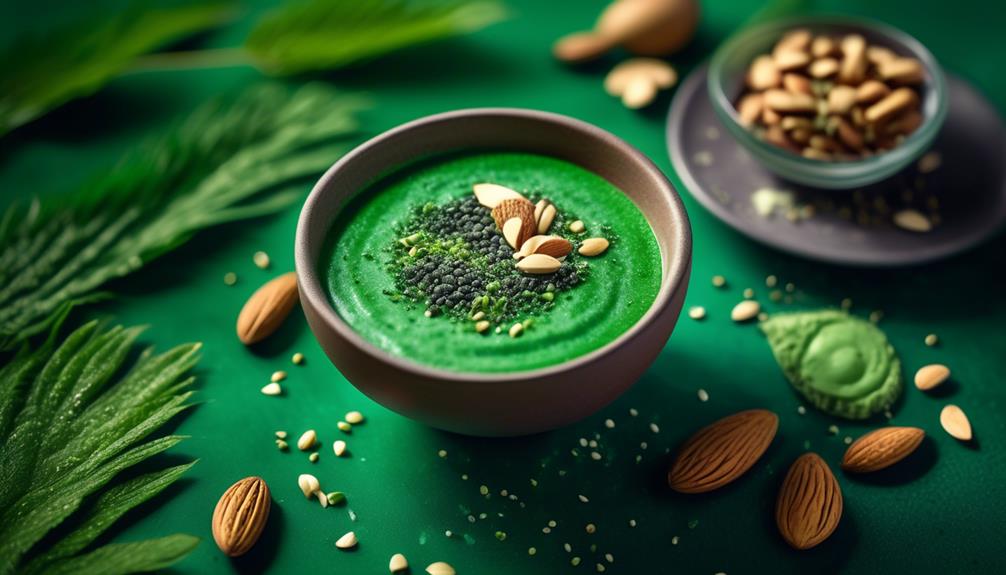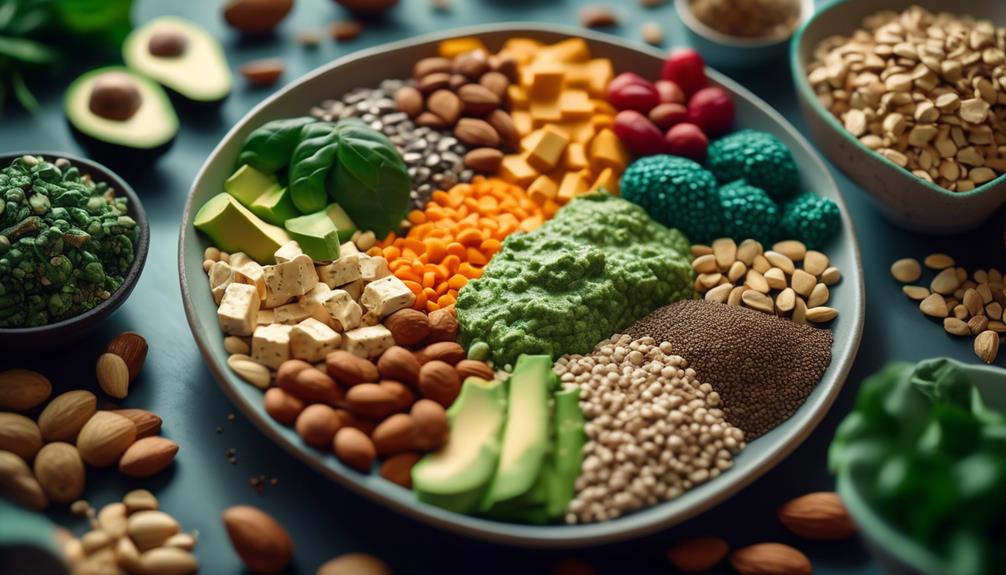They say, 'You are what you eat.' Well, if you're following a vegetarian keto diet, it's crucial to choose your protein sources wisely. Whether you're a seasoned vegetarian or just exploring the world of plant-based eating, finding adequate protein can be a challenge.
But fear not! In this discussion, we will uncover the top plant-based protein sources that will keep you satisfied and on track with your vegetarian keto lifestyle. So, get ready to discover some delicious and nutritious options that will make your taste buds tingle and your body thrive.
Tofu

Tofu, a versatile plant-based protein source, is commonly used in vegetarian keto diets due to its low carbohydrate content and high protein content. Tofu is made from soybeans and is a staple in many Asian cuisines. It's a popular choice for vegetarians and vegans looking to increase their protein intake without consuming animal products.
One of the main benefits of incorporating tofu into your diet is its high protein content. Just half a cup of tofu contains approximately 10 grams of protein. This makes it an excellent choice for individuals following a vegetarian keto diet, as protein is essential for maintaining muscle mass and promoting satiety.
In addition to being a great source of protein, tofu also offers several health benefits. It's low in saturated fat and cholesterol, making it a heart-healthy protein option. Tofu is also rich in isoflavones, which are plant compounds that have been shown to have various health benefits, including reducing the risk of certain chronic diseases.
When it comes to tofu recipes, the possibilities are endless. You can use firm tofu in stir-fries, scramble it as a substitute for scrambled eggs, or even blend it into smoothies for added creaminess. Soft tofu can be used in soups, dips, or desserts. With a little creativity, you can easily incorporate tofu into your vegetarian keto diet and enjoy its health benefits.
Tempeh
When it comes to plant-based protein sources for a vegetarian keto diet, tempeh is a fantastic option.
Not only is tempeh rich in protein, but it also provides a wide range of essential nutrients.
Additionally, tempeh can be cooked in various ways, making it a versatile ingredient in your meals.
Nutritional Profile
Tempeh offers a nutritious profile that makes it a valuable plant-based protein source for those following a vegetarian keto diet. This fermented soy product is packed with essential nutrients, including protein, fiber, and various vitamins and minerals.
A 100-gram serving of tempeh contains around 19 grams of protein, making it an excellent option for meeting your daily protein needs. Additionally, tempeh is rich in iron, calcium, manganese, and phosphorus. It also provides a good amount of vitamin B12, which is often lacking in vegetarian and vegan diets.
Tempeh's high protein content and nutrient profile make it a great choice for muscle recovery and growth. To optimize protein absorption, it's recommended to cook tempeh thoroughly and include it in dishes with other sources of amino acids.
Cooking Methods
To ensure you get the most out of tempeh as a plant-based protein source, it's important to explore different cooking methods that will enhance its flavor and texture while retaining its nutritional benefits.
Tempeh is a versatile ingredient that can be cooked using various techniques to suit your taste preferences.
One popular cooking method is marinating the tempeh before grilling or baking it. This process helps to infuse the tempeh with flavors and gives it a crispy exterior.
Another technique is steaming, which helps to soften the tempeh and make it more tender.
Additionally, you can crumble tempeh and use it as a ground meat substitute in recipes like tacos or chili.
Health Benefits
One of the key reasons to incorporate tempeh into your vegetarian keto diet is its numerous health benefits.
Tempeh isn't only a great source of plant-based protein but also offers several other advantages for your overall well-being.
With its high protein content, tempeh can help support muscle growth and repair, making it an excellent option for athletes and those looking to build lean muscle mass.
Additionally, tempeh is rich in fiber, which can aid in digestion and promote a healthy gut.
It also contains several essential vitamins and minerals, including iron, calcium, and vitamin B12, which are important for maintaining optimal health.
Moreover, tempeh is fermented, which enhances its nutritional profile and may contribute to better gut health.
Seitan
Seitan, also known as wheat meat or wheat gluten, is a plant-based protein source that offers several health benefits.
It's low in fat and carbohydrates, making it suitable for a vegetarian keto diet.
Additionally, seitan is rich in protein, providing all the essential amino acids your body needs.
Incorporating seitan into your meals is a great way to boost your protein intake and enjoy a meat-like texture in your dishes.
Health Benefits of Seitan
Seitan offers numerous health benefits due to its high protein content and low carbohydrate and fat content. Here are four key health benefits of incorporating seitan into your diet:
- Rich in Protein: Seitan is made from wheat gluten, which is packed with protein. In fact, it contains about 25 grams of protein per 3.5 ounces, making it a great source of plant-based protein for vegetarians and vegans.
- Low in Carbohydrates: For those following a low-carb diet, seitan is an excellent choice. It contains minimal carbohydrates, making it suitable for individuals looking to maintain stable blood sugar levels and support weight loss.
- Versatile Cooking Techniques: Seitan's texture and taste are highly adaptable, making it a versatile ingredient in various dishes. You can grill, sauté, bake, or even deep-fry seitan to create a wide range of flavorful and satisfying meals.
- A Good Source of Iron: Seitan is also a good source of iron, an essential mineral that plays a crucial role in carrying oxygen throughout the body. Adequate iron intake is important for maintaining energy levels and supporting overall health.
Incorporating seitan into your diet can provide you with a nutritious and tasty protein source while offering numerous health benefits.
Cooking With Seitan
Looking to add a versatile and nutritious ingredient to your cooking repertoire? Seitan is a great choice. This plant-based protein, made from wheat gluten, isn't only high in protein but also low in carbs, making it an excellent option for those following a vegetarian keto diet.
When it comes to cooking with seitan, there are various techniques you can try. One popular method is to slice seitan into strips or cubes and stir-fry it with your favorite vegetables and seasonings. You can also marinate seitan in a flavorful sauce and grill it for a delicious barbecue option.
Additionally, seitan can be used in stews, curries, and even as a meat substitute in sandwiches and burgers. With its chewy texture and ability to absorb flavors, seitan is a versatile ingredient that can elevate your vegetarian keto dishes.
Lentils

Are lentils a suitable plant-based protein source for those following a vegetarian keto diet? Let's explore the nutritional benefits and cooking methods of lentils to find out.
- Nutritional Benefits:
- Lentils are a rich source of plant-based protein, containing approximately 18 grams of protein per cup.
- They're also high in dietary fiber, which can aid in digestion and help regulate blood sugar levels.
- Lentils are packed with essential vitamins and minerals, including folate, iron, and potassium.
- These legumes are low in fat and calories, making them a great addition to a weight-loss friendly diet.
- Cooking Methods:
- Lentils can be cooked in various ways, including boiling, simmering, or pressure cooking.
- They can be used in soups, stews, salads, or even as a meat substitute in vegetarian dishes.
- Soaking lentils before cooking can help reduce cooking time and improve digestibility.
- Lentils can be flavored with herbs, spices, and vegetables to enhance their taste and nutritional profile.
Chickpeas
To continue exploring plant-based protein sources for a vegetarian keto diet, let's now turn our attention to the versatile and nutritious chickpeas. Chickpeas, also known as garbanzo beans, are a great addition to any vegetarian keto meal plan. Not only are they packed with protein, but they also provide a good amount of fiber, vitamins, and minerals.
When it comes to cooking chickpeas, there are a few techniques you can try. One popular method is boiling them until they're tender. You can then use them in salads, soups, or even make homemade hummus. Another option is roasting them in the oven with some olive oil and spices. This gives them a crispy texture, making them a delicious snack or salad topper.
If you're looking for some tasty recipes, you're in luck. Chickpeas can be used in a variety of dishes. One popular recipe is chickpea curry, where chickpeas are cooked in a flavorful blend of spices, tomatoes, and coconut milk. Another option is chickpea salad, which combines chickpeas with fresh vegetables, herbs, and a tangy dressing. Additionally, you can make chickpea flour pancakes or use chickpea pasta as a low-carb alternative.
Incorporating chickpeas into your vegetarian keto diet can provide you with a good amount of protein, fiber, and essential nutrients. So go ahead and give these recipes and cooking techniques a try for a delicious and healthy meal.
Hemp Seeds

Hemp seeds offer numerous nutritional benefits, making them an excellent addition to your vegetarian keto diet. Packed with protein, fiber, and healthy fats, hemp seeds can help support muscle growth, promote satiety, and provide essential nutrients.
These versatile seeds can be easily incorporated into various recipes, including smoothies, salads, and baked goods, allowing you to reap their benefits in a delicious and convenient way.
Nutritional Benefits of Hemp
With their rich nutrient profile and versatile culinary uses, hemp seeds offer a wide range of nutritional benefits that make them an excellent addition to a plant-based keto diet. Here are four reasons why hemp seeds are a valuable source of nutrition:
- High in Protein: Hemp seeds are a complete protein source, meaning they provide all essential amino acids that your body needs. This makes them an ideal choice for vegetarians and vegans looking to meet their protein requirements.
- Healthy Fats: Hemp seeds are rich in omega-3 and omega-6 fatty acids, which are essential for brain health, reducing inflammation, and supporting heart health. Incorporating hemp seeds into your diet can help maintain a healthy balance of these essential fats.
- Fiber-Rich: Hemp seeds are a great source of dietary fiber, which aids in digestion, helps regulate blood sugar levels, and promotes feelings of satiety. Including hemp seeds in your meals can support a healthy digestive system.
- Vitamins and Minerals: Hemp seeds are packed with various vitamins and minerals, including vitamin E, magnesium, potassium, and zinc. These nutrients play essential roles in maintaining overall health and supporting various bodily functions.
Incorporating hemp seeds into your cooking techniques, such as sprinkling them on salads, blending them into smoothies, or using them as a topping for yogurt or oatmeal, can add a nutritious boost to your plant-based keto diet.
Easy Incorporation Into Recipes
Now let's explore how you can easily incorporate hemp seeds into your recipes to enhance the nutritional value of your plant-based keto diet.
Hemp seeds are a versatile ingredient that can be added to a variety of dishes to provide a boost of plant-based protein and healthy fats.
One simple way to incorporate hemp seeds into your recipes is by sprinkling them on top of salads, soups, or roasted vegetables.
You can also blend them into smoothies or incorporate them into homemade energy bars or granola.
For a delicious and nutritious breakfast option, try adding hemp seeds to your overnight oats or chia pudding.
When meal planning, consider using hemp seeds as a substitute for breadcrumbs in recipes like veggie burgers or as a topping for roasted sweet potatoes.
With these recipe ideas, incorporating hemp seeds into your plant-based keto diet is both easy and delicious.
Versatility in Plant-Based Diets
To enhance the versatility of your plant-based diet, incorporating hemp seeds can provide a wide range of nutritional benefits and add a unique flavor profile to your meals. Here are four reasons why hemp seeds are a great addition to your meal planning:
- Complete plant-based protein: Hemp seeds contain all nine essential amino acids, making them a valuable source of protein for vegetarians and vegans.
- Omega-3 fatty acids: Hemp seeds are rich in omega-3 fatty acids, which are essential for brain health and reducing inflammation in the body.
- Fiber-rich: A high-fiber diet is important for maintaining a healthy digestive system. Hemp seeds are an excellent source of dietary fiber, aiding in digestion and promoting feelings of fullness.
- Versatile ingredient: Hemp seeds can be easily incorporated into various recipes, such as smoothies, salads, baked goods, and even as a topping for yogurt or cereal.
Chia Seeds

Chia seeds are a versatile and nutrient-dense plant-based protein source that can be incorporated into a vegetarian keto diet. These tiny seeds are packed with essential nutrients and offer numerous health benefits. When it comes to chia seed recipes, the options are endless.
One of the key health benefits of chia seeds is their high protein content. Protein is essential for building and repairing tissues, and it also helps to keep you feeling full and satisfied. Chia seeds are an excellent source of plant-based protein, providing all the essential amino acids your body needs.
In addition to protein, chia seeds are rich in fiber, healthy fats, and various vitamins and minerals. They're particularly high in omega-3 fatty acids, which are important for heart health and reducing inflammation in the body.
To incorporate chia seeds into your vegetarian keto diet, you can add them to smoothies, sprinkle them on top of salads or yogurt, or use them as an egg substitute in baked goods. You can also make chia seed pudding by combining chia seeds with your choice of milk and sweetener, and letting it sit overnight to thicken.
Almonds
As we move on to discussing 'Almonds', another excellent plant-based protein source for a vegetarian keto diet comes to mind. Almonds aren't only delicious but also packed with essential nutrients that can support your overall health. Here are some nutritional benefits of almonds:
- High in protein: Almonds are a great source of plant-based protein, making them an ideal option for vegetarians on a keto diet. A 1-ounce serving of almonds contains about 6 grams of protein.
- Rich in healthy fats: Almonds are known for their high content of monounsaturated fats, which have been associated with heart health and weight management. These healthy fats can also help keep you feeling full and satisfied.
- Excellent source of fiber: Fiber is essential for maintaining healthy digestion and promoting feelings of fullness. Almonds are a good source of dietary fiber, with about 3 grams per ounce.
- Packed with vitamins and minerals: Almonds are a good source of vitamin E, magnesium, and potassium, which play important roles in supporting various bodily functions.
Incorporating almonds into your vegetarian keto diet is easy. You can enjoy them as a snack, add them to salads, or use almond flour in baking. With their nutritional benefits and versatility, almonds are a fantastic addition to any plant-based keto meal plan.
Pumpkin Seeds

If you're looking for a nutritious and versatile plant-based protein source for your vegetarian keto diet, look no further than pumpkin seeds. These tiny seeds are packed with essential nutrients and can be easily incorporated into your meals. Pumpkin seeds are an excellent source of protein, providing about 8 grams per ounce. They're also rich in healthy fats, fiber, and a variety of vitamins and minerals.
When it comes to cooking techniques, you can enjoy pumpkin seeds in many different ways. One popular method is roasting them in the oven. Simply spread the seeds on a baking sheet, drizzle with some olive oil, sprinkle with your favorite seasonings, and roast at 350°F for about 10-15 minutes until they turn golden brown. You can also add pumpkin seeds to your salads, smoothies, or use them as a topping for soups and stir-fries.
Looking for recipe ideas? How about a pumpkin seed pesto? Blend roasted pumpkin seeds, garlic, basil, olive oil, and a squeeze of lemon juice until smooth. Use it as a spread for sandwiches or a topping for grilled vegetables. Another idea is to make pumpkin seed butter by blending roasted seeds with a bit of salt and oil until creamy. Spread it on low-carb crackers or use it as a dip for veggies.
Quinoa
Quinoa is a nutrient-dense grain that can be a valuable addition to your vegetarian keto diet. Here's why you should consider including quinoa in your meals:
- Rich in Protein: Quinoa is one of the few plant-based sources that provide a complete protein, containing all nine essential amino acids. This makes it an excellent choice for meeting your protein needs on a vegetarian keto diet.
- High in Fiber: With about 2.6 grams of fiber per serving, quinoa can support healthy digestion and help you feel full for longer. Its fiber content also aids in maintaining stable blood sugar levels.
- Packed with Nutrients: Quinoa is a great source of essential minerals such as magnesium, iron, and zinc. These nutrients play crucial roles in energy production, immune function, and overall health.
- Versatile Cooking Techniques: Quinoa can be prepared in various ways to suit your taste preferences. You can cook it on the stovetop, use it as a base for salads, or even make it into flour for baking. Its mild, nutty flavor makes it a versatile ingredient in a wide range of dishes.
Incorporating quinoa into your vegetarian keto diet can't only enhance its nutritional value but also provide you with a satisfying and delicious option for your meals.
Spirulina

To further expand your repertoire of plant-based protein sources on a vegetarian keto diet, let's now explore the nutritional benefits of incorporating spirulina into your meals.
Spirulina is a blue-green algae that's packed with essential nutrients and is considered a complete protein, meaning it contains all nine essential amino acids that our bodies can't produce on their own. This makes it an excellent choice for vegetarians and vegans looking to meet their protein needs.
One of the great things about spirulina is its versatility. You can easily incorporate it into your meals by adding it to smoothies, salad dressings, or even mixing it into your favorite recipes. Just remember that a little goes a long way, as spirulina has a strong flavor that can be overpowering if used in excess.
In addition to being a protein powerhouse, spirulina is also rich in vitamins, minerals, and antioxidants. It contains high levels of iron, magnesium, and calcium, which are essential for maintaining optimal health. However, it's worth mentioning that spirulina may not be suitable for everyone. Some people may experience digestive issues or allergic reactions when consuming spirulina, so it's important to start with small amounts and monitor your body's response.
Edamame
Edamame is a nutritious and protein-rich plant-based food that can be a valuable addition to a vegetarian keto diet. Here are four benefits of including edamame in your diet and some cooking methods to try:
- High in Protein: Edamame is an excellent source of plant-based protein, containing around 17 grams of protein per cup. This makes it a great option for vegetarians and vegans looking to meet their protein needs while following a keto diet.
- Rich in Fiber: Fiber is essential for maintaining healthy digestion and promoting satiety. Edamame is high in fiber, with approximately 8 grams per cup. Including fiber-rich foods like edamame in your diet can help to control blood sugar levels and support weight management.
- Packed with Vitamins and Minerals: Edamame is a good source of essential vitamins and minerals, including vitamin K, folate, iron, and magnesium. These nutrients play a crucial role in maintaining overall health and supporting various bodily functions.
- Versatile Cooking Methods: Edamame can be enjoyed in several ways. You can steam or boil the pods until they're tender, and then sprinkle them with a little sea salt for a simple and satisfying snack. Alternatively, you can add shelled edamame to salads, stir-fries, or soups for an extra boost of protein and texture.
Incorporating edamame into your vegetarian keto diet can provide you with a range of benefits, including protein, fiber, vitamins, and minerals. Try experimenting with different cooking methods to find your favorite way to enjoy this nutritious food.
Greek Yogurt

If you're looking to add another protein-rich option to your vegetarian keto diet, Greek yogurt is a versatile and nutritious choice. Greek yogurt is known for its high protein content, making it a great addition to your meals and snacks. It's also low in carbohydrates and contains beneficial nutrients.
Greek yogurt is rich in essential amino acids, which are the building blocks of proteins. These amino acids help support muscle growth and repair, making Greek yogurt an excellent choice for athletes and those looking to build lean muscle mass. Additionally, Greek yogurt is a good source of calcium, which is essential for strong bones and teeth.
When choosing Greek yogurt, it's important to look for brands that offer high-quality products. Some of the best brands include Fage, Chobani, and Oikos. These brands are known for their thick and creamy texture, as well as their high protein content. It's also important to choose plain Greek yogurt without added sugars or flavors to keep your carbohydrate intake low.
Conclusion
In conclusion, incorporating plant-based protein sources into a vegetarian keto diet can provide a wide range of nutrients and support overall health.
Did you know that a 3.5-ounce serving of tempeh contains about 19 grams of protein, making it a great option for those looking to increase their protein intake?
By including these protein-rich foods in your diet, you can meet your nutritional needs while following a vegetarian keto lifestyle.







